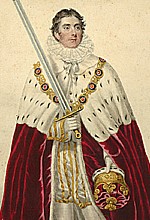Henry Pelham-Clinton, 4th Duke of Newcastle-under-Lyne
| Henry Pelham-Clinton | |
|---|---|

The 4th Duke of Newcastle-under-Lyne
|
|
| Born | 31 January 1785 |
| Died | 12 January 1851 (aged 65) Clumber Park |
| Resting place | All Saints' Church, West Markham |
| Title | Duke of Newcastle-under-Lyne |
| Tenure | 1795–1851 |
| Nationality | British |
| Spouse(s) | Georgiana Elizabeth Mundy |
Henry Pelham Fiennes Pelham-Clinton, 4th Duke of Newcastle-under-Lyne KG (31 January 1785 – 12 January 1851) was a British nobleman and politician who played a leading part in British politics in the late 1820s and early 1830s. He was styled Lord Clinton from birth until 1794 and Earl of Lincoln between 1794 and 1795.
Pelham-Clinton was the eldest son of Thomas Pelham-Clinton, 3rd Duke of Newcastle-under-Lyne, and his wife Lady Anna Maria (née Stanhope), and was educated at Eton College. His father died when he was ten years old. In 1803, encouraged by the Peace of Amiens which provided a break in hostilities with France, his mother and stepfather took him on a European Tour. Unfortunately, war broke out once again, and the young duke was detained at Tours in 1803, where he remained until 1806.
On his return to England in 1807, he entered on life with many personal advantages, and with a considerable fortune. He married at Lambeth, 18 July 1807, a great heiress, Georgiana Elizabeth, daughter of Edward Miller Mundy of Shipley, Derbyshire. He served as Lord Lieutenant of Nottinghamshire from 1809 to 1839 and was also Steward of Sherwood Forest and of Folewood Park. In 1812 he was made a Knight of the Garter.
On 22 March 1821, Newcastle published a pamphlet in the form of a letter to Lord Liverpool, protesting against a Bill for Catholic Emancipation. Newcastle argued that if his government supported Emancipation they would be doing the country an injustice for two main reasons. Firstly, the attention of the nation was preoccupied with domestic problems and little interested in the question, so to pass Emancipation now would be a betrayal. Secondly, the government could not be neutral on this question because if the Bill passed Parliament, the King would have to refuse Royal Assent as it would be in breach of his promise, made in the Coronation Oath, to uphold the Protestant constitution. If the King were to do this without the advice of his ministers then it would be unconstitutional since the King could only act on the advice of his ministers. Thereby the government should adopt a position on the question, and this position should of necessity be opposed to Emancipation.
...
Wikipedia
